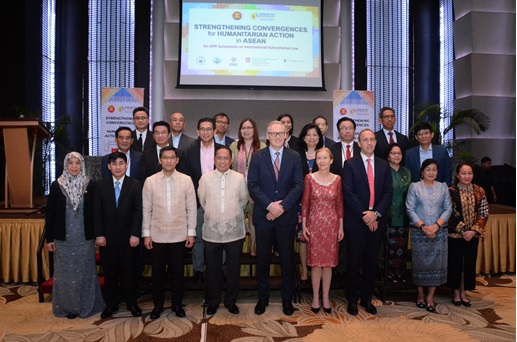
The AIPR Governing Council led by its Chair, H.E. Elizabeth P. Buensuceso, and the Members of the AIPR Advisory Board, pose for a group photo with the Symposium’s keynote speaker, OPAPP Secretary Jesus Dureza. Also in the photo are H.E. Andrea Reichlin (Swiss Ambassador to the Philippines), H.E. Erik Forner (Norwegian Ambassador to the Philippines), and Department of Foreign Affairs Undersecretary for Civilian Security and Consular Concerns, Jose Luis Montales.
3 October, Manila – The ASEAN Institute for Peace and Reconciliation (AIPR), together with the Philippine Office of the Presidential Adviser on the Peace Process (OPAPP) and the International Committee of the Red Cross (ICRC), held a two-day Symposium entitled Strengthening Convergences for Humanitarian Action: An AIPR Symposium on International Humanitarian Law on 2-3 October 207 in Manila, Philippines. The Governments of Norway and Switzerland also supported the Symposium.
The Symposium, one of the activities organized to commemorate the 50th Anniversary of ASEAN, welcomed over 170 policy-makers and peace practitioners from ASEAN Member States, and civil society organizations from all over the world, to explore the convergences of International Humanitarian Law, Humanitarian Principles, Religious Norms and Customary Practices to address some specific humanitarian and protection challenges within ASEAN.
In his keynote address, Secretary Jesus Dureza, Presidential Adviser on the Peace Process and Chair of the AIPR Advisory Board acknowledged that violent extremism is a problem that ASEAN needs to address. He continued to say that while modern technology has been an effective tool in countering extremists, it comes with a great price.“We see missiles, smart bombs and drones providing means of efficiently killing the enemy. But with all the emergence of technology, we lose the humanity part. Sometimes, we forget what effect it has to victims, especially innocent civilians,” he expressed. In that, he called on the body to put not only heads, but also hearts together, in the pursuit of doable action plans that will translate to positive changes for the lives of people.
Mr. Pascal Porchet, Head of the ICRC Delegation in the Philippines, underscored the importance of this symposium as a “regional dialogue among stakeholders concerned with humanitarian access to people in need in complex emergencies, and to contribute towards conflict prevention in ASEAN.” H.E. Andrea Reichlin, Ambassador of Switzerland to the Philippines, and H.E. Erik Forner, Ambassador of Norway to the Philippines, in their respective opening remarks, both highlighted the importance of partnerships to address humanitarian assistance and protection challenges with a view to ensure the respect of humanitarian law.
The interactive discussions covered, among others, the protection challenges related to conflicts and ethnic tensions in the region, and the challenges faced in translating humanitarian principles and religious values into practice, with a particular focus in strengthening protection for vulnerable groups. The Symposium identified best practices in terms of enhancing respect and appreciation for the principles of humanitarian law.
H.E. Elizabeth P. Buensuceso, Permanent Representative of the Philippines to ASEAN and Chair of the AIPR Governing Council, together with Mr. Christoph Sutter, Head of the ICRC Delegation to Indonesia and Timor Leste, synthesized the substantive sessions and consolidated the various recommendations that the discussions had yielded. Of note were the recommendations to strengthen cooperation with faith-based organizations and nurture partnerships at the local, national and international levels with a view to promote principled humanitarian action in the region.
In her closing remarks, Ambassador Buensuceso commended the Symposium’s participants for providing inspiration on “how each of us can become active members of an international family of peace-makers and peace lovers.” She underscored that “despite the all too-frequent gloomy and devastating news of trouble, conflict and hatred in the world today, there are religious leaders, academics, humanitarian workers, legal and law enforcement officers, government officials, diplomats, health-care providers, educators and other segments of civil society that are focused on the upliftment of human dignity and the provision of humanitarian assistance to every human life, particularly that of the vulnerable, the weak --- those people who have nothing to do with the conflict in the first place.”
The ASEAN Institute for Peace and Reconciliation is the ASEAN institution for research activities on peace, conflict management and conflict resolution. It is based in Jakarta, Indonesia.
END.

